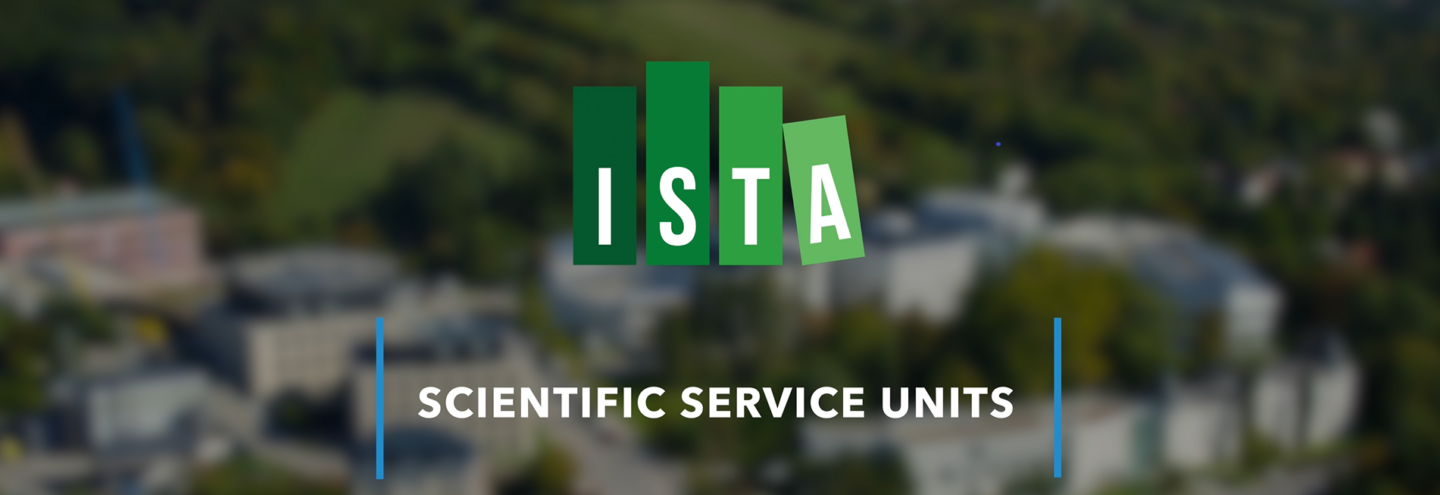Scientific Service Units
Nine facilities provide research infrastructure on campus.
The Scientific Service Units (SSUs) are one of Institute of Science and Technology Austria (ISTA)´s strategic key factors. These facilities pool scientific infrastructure used by more than one research group to avoid a duplication of efforts and expenses. Their cutting-edge equipment and expert services allow scientists to perform research at an internationally competitive level.

Over the years, the Scientific Service Units grew up to more than 140 employees in nine facilities. In order to meet the needs of existing research groups and to support the start-up of new faculty members, they always strive to adapt and expand their services. Constant learning ensures that they provide excellent know-how for world-class research.
The Scientific Service Units act as an interdisciplinary platform that, in accordance with the mission statement, maximizes the sharing of equipment among multiple research groups.
Mondal S, Jethwa RB, Pant B, Hauschild R, Freunberger SA. 2024. Singlet oxygen in non-aqueous oxygen redox: Direct spectroscopic evidence for formation pathways and reliability of chemical probes. Faraday Discussions. 248, 175–189. View
Zavadakova A, Vistejnova L, Belinova T, Tichanek F, Bilikova D, Mouton PR. 2023. Novel stereological method for estimation of cell counts in 3D collagen scaffolds. Scientific Reports. 13(1), 7959. View
Huljev K, Shamipour S, Nunes Pinheiro DC, Preusser F, Steccari I, Sommer CM, Naik S, Heisenberg C-PJ. 2023. A hydraulic feedback loop between mesendoderm cell migration and interstitial fluid relocalization promotes embryonic axis formation in zebrafish. Developmental Cell. 58(7), 582–596.e7. View
Zeller P, Yeung J, Viñas Gaza H, de Barbanson BA, Bhardwaj V, Florescu M, van der Linden R, van Oudenaarden A. 2023. Single-cell sortChIC identifies hierarchical chromatin dynamics during hematopoiesis. Nature Genetics. 55, 333–345. View
Fäßler F, Javoor M, Datler J, Döring H, Hofer F, Dimchev GA, Hodirnau V-V, Faix J, Rottner K, Schur FK. 2023. ArpC5 isoforms regulate Arp2/3 complex–dependent protrusion through differential Ena/VASP positioning. Science Advances. 9(3), add6495. View
Pertl F, Sobarzo Ponce JCA, Shafeek LB, Cramer T, Waitukaitis SR. 2022. Quantifying nanoscale charge density features of contact-charged surfaces with an FEM/KPFM-hybrid approach. Physical Review Materials. 6(12), 125605. View
Prehal C, Mondal S, Lovicar L, Freunberger SA. 2022. Exclusive solution discharge in Li-O₂ batteries? ACS Energy Letters. 7(9), 3112–3119. View
Chang C, Liu Y, Lee S, Spadaro M, Koskela KM, Kleinhanns T, Costanzo T, Arbiol J, Brutchey RL, Ibáñez M. 2022. Surface functionalization of surfactant-free particles: A strategy to tailor the properties of nanocomposites for enhanced thermoelectric performance. Angewandte Chemie – International Edition. 61(35), e202207002. View
Medina Ramos RA. 2024. Exploring the optimization landscape of variational quantum algorithms. Institute of Science and Technology Austria. View
Raices J. 2024. Novel approaches to studying alternative splicing in Drosophila Melanogaster: Insights into sex-specific gene expression and the evolution of sex determination. Institute of Science and Technology Austria. View
Cheung GT, Streicher C, Hippenmeyer S. 2024. Protocol for quantitative reconstruction of cell lineage using mosaic analysis with double markers in mice. STAR Protocols. 5(3), 103157. View
Cheung GT, Pauler F, Koppensteiner P, Hippenmeyer S. 2024. Protocol for mapping cell lineage and cell-type identity of clonally-related cells in situ using MADM-CloneSeq. STAR Protocols. 5(3), 103168. View
Kohopää K, Ronzani A, Jabdaraghi RN, Bera A, Ribeiro M, Hazra D, Senior JL, Prunnila M, Govenius J, Lehtinen JS, Kemppinen A. 2024. Effect of ion irradiation on superconducting thin films. APL Materials. 12(7), 071101. View
![]()
Interreg V A Austria Czech Republic
Institute of Science and Technology Austria
c/o Scientific Service Units
Am Campus 1, A-3400 Klosterneuburg, Austria
Office: Voestalpine building, ground floor
E-mail: ssu-office@ist.ac.at
